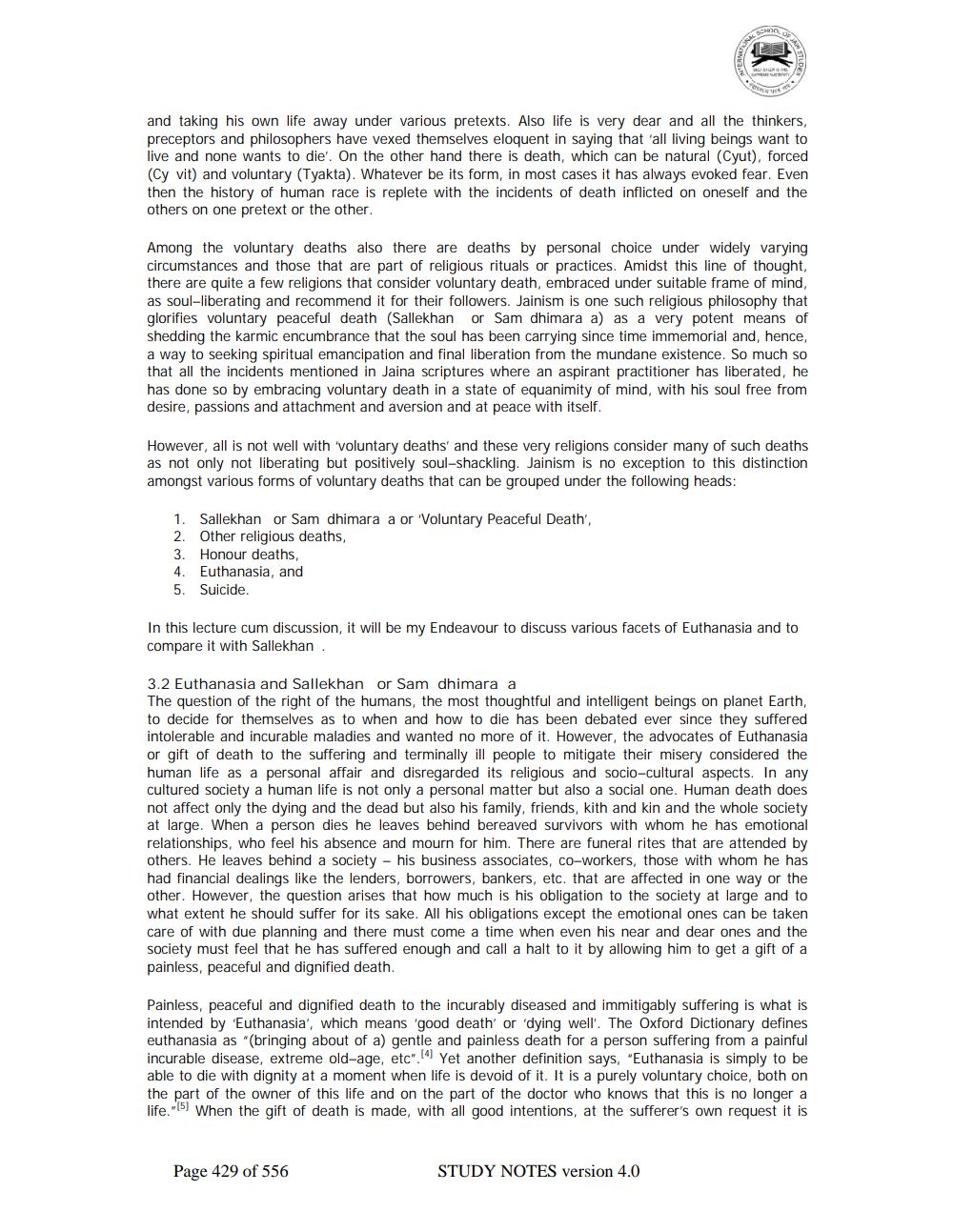________________
and taking his own life away under various pretexts. Also life is very dear and all the thinkers, preceptors and philosophers have vexed themselves eloquent in saying that 'all living beings want to live and none wants to die'. On the other hand there is death, which can be natural (Cyut), forced (Cy vit) and voluntary (Tyakta). Whatever be its form, in most cases it has always evoked fear. Even then the history of human race is replete with the incidents of death inflicted on oneself and the others on one pretext or the other.
Among the voluntary deaths also there are deaths by personal choice under widely varying circumstances and those that are part of religious rituals or practices. Amidst this line of thought, there are quite a few religions that consider voluntary death, embraced under suitable frame of mind, as soul-liberating and recommend it for their followers. Jainism is one such religious philosophy that glorifies voluntary peaceful death (Sallekhan or Sam dhimara a) as a very potent means of shedding the karmic encumbrance that the soul has been carrying since time immemorial and, hence, a way to seeking spiritual emancipation and final liberation from the mundane existence. So much so that all the incidents mentioned in Jaina scriptures where an aspirant practitioner has liberated, he has done so by embracing voluntary death in a state of equanimity of mind, with his soul free from desire, passions and attachment and aversion and at peace with itself.
However, all is not well with 'voluntary deaths' and these very religions consider many of such deaths as not only not liberating but positively soul-shackling. Jainism is no exception to this distinction amongst various forms of voluntary deaths that can be grouped under the following heads:
1. Sallekhan or Sam dhimara a or 'Voluntary Peaceful Death',
2. Other religious deaths,
3.
Honour deaths,
4. Euthanasia, and
5. Suicide.
In this lecture cum discussion, it will be my Endeavour to discuss various facets of Euthanasia and to compare it with Sallekhan.
3.2 Euthanasia and Sallekhan or Sam dhimara a
The question of the right of the humans, the most thoughtful and intelligent beings on planet Earth, to decide for themselves as to when and how to die has been debated ever since they suffered intolerable and incurable maladies and wanted no more of it. However, the advocates of Euthanasia or gift of death to the suffering and terminally ill people to mitigate their misery considered the human life as a personal affair and disregarded its religious and socio-cultural aspects. In any cultured society a human life is not only a personal matter but also a social one. Human death does not affect only the dying and the dead but also his family, friends, kith and kin and the whole society at large. When a person dies he leaves behind bereaved survivors with whom he has emotional relationships, who feel his absence and mourn for him. There are funeral rites that are attended by others. He leaves behind a society - his business associates, co-workers, those with whom he has had financial dealings like the lenders, borrowers, bankers, etc. that are affected in one way or the other. However, the question arises that how much is his obligation to the society at large and to what extent he should suffer for its sake. All his obligations except the emotional ones can be taken care of with due planning and there must come a time when even his near and dear ones and the society must feel that he has suffered enough and call a halt to it by allowing him to get a gift of a painless, peaceful and dignified death.
Painless, peaceful and dignified death to the incurably diseased and immitigably suffering is what is intended by 'Euthanasia', which means 'good death' or 'dying well. The Oxford Dictionary defines euthanasia as "(bringing about of a) gentle and painless death for a person suffering from a painful incurable disease, extreme old-age, etc". [4] Yet another definition says, "Euthanasia is simply to be able to die with dignity at a moment when life is devoid of it. It is a purely voluntary choice, both on the part of the owner of this life and on the part of the doctor who knows that this is no longer a life. [5] When the gift of death is made, with all good intentions, at the sufferer's own request it is
Page 429 of 556
STUDY NOTES version 4.0




